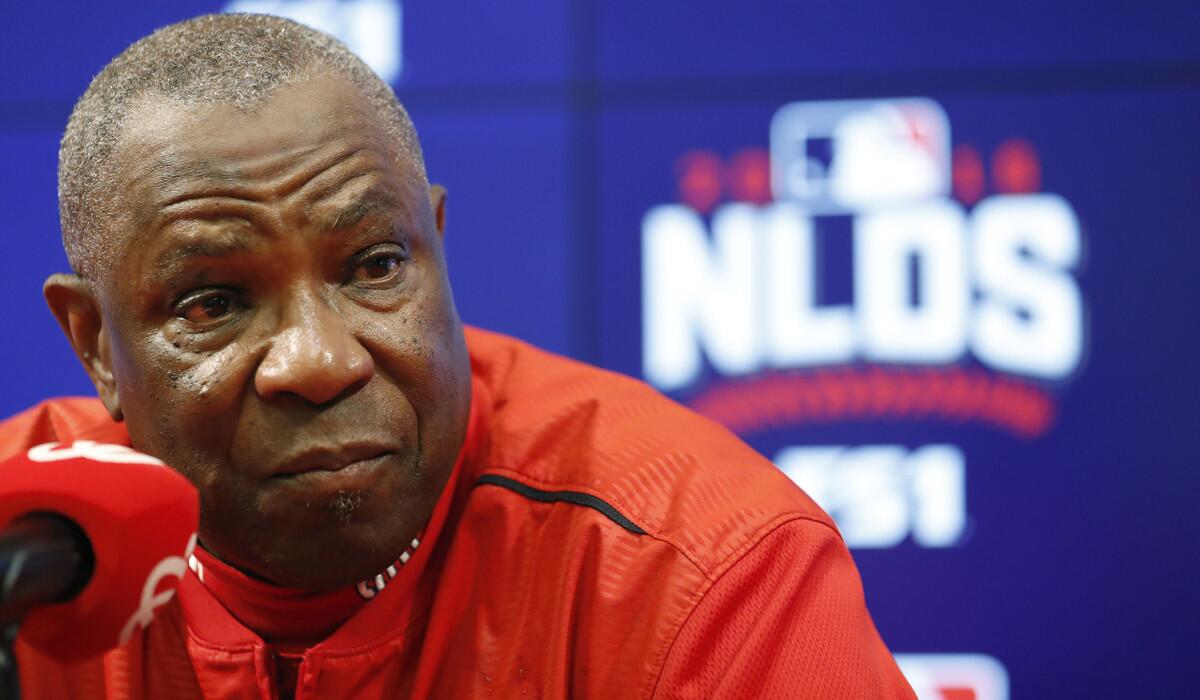Nationals Manager Dusty Baker is experienced, successful and smart ... and those are GOOD things

- Share via
Reporting from Washington, D.C. — The playoffs are about to start, and Dusty Baker’s team is in. If you believe Baker is pleasantly surprised, well, you don’t really know him.
“This,” he said Tuesday, “is where I am supposed to be.”
The postseason came and went without him the previous two years. So did baseball. He traveled. He started a couple of businesses. He saw his daughter married in the family backyard.
Baker, 67, was not done with baseball. He wondered why baseball seemed to be done with him.
He reached October with the San Francisco Giants, with the Chicago Cubs, and even with the Cincinnati Reds — three times with the small-market Reds, the only times they have made the postseason in the last 20 years. He won more games than Tommy Lasorda, in fewer seasons. He could hardly believe that guys barely half his age could get hired as major league managers, and he could not even get a call back.
“I wondered,” he said, “if I was on the blacklist.”
The image that defined the Washington Nationals last season was this: Jonathan Papelbon choking Bryce Harper in the dugout, with Manager Matt Williams unaware of the incident as he stood a few feet away. In their new manager, the Nationals needed a leader above all.
The Nationals had the talent. Baker had the charisma. He might not have been their first choice — the Nats hired him after negotiations with Bud Black reportedly collapsed — but General Manager Mike Rizzo credited Baker for setting a championship tone.
“High energy, big presence, stress-less environment,” Rizzo said.
“He went into a situation where the team had high expectations,” said Angels Manager Mike Scioscia, a teammate with Baker on the Dodgers’ 1981 World Series champions. “He’s met those expectations.
“He’s brought them together and brought them to a higher level as a group. He’s a great baseball mind. He’s a great leader. He’s had success everywhere he’s been.”
The Dodgers did some background work on Baker last winter, respectful of his ability to run a clubhouse, but he was not one of the nine candidates invited to interview for the vacancy ultimately filled by Dave Roberts. The three finalists — Roberts, Gabe Kapler and Darin Erstad — never had managed in the major leagues.
Davey Lopes, who coached for the Dodgers from 2011-15 and joined Baker’s staff in Washington this year, said the younger generation of general managers might be scared off by a successful older manager.
“I think they’re intimidated a lot of times,” Lopes said. “The fact of the matter is, they really don’t have that much experience. They know their jobs exceptionally well, and they do a good job. But it’s totally new.
“It’s almost like, today, when they say you’re ‘old school,’ that’s a bad word.”
Of the 19 managers hired since the 2013-14 off-season, 13 have been first-timers. One major league official said he wondered whether the new wave of general managers increasingly views experienced managers as “dinosaurs” resistant to analytics, and to sharing power with the front office.
The days of a long-tenured manager like Baker, Scioscia or Bruce Bochy might be coming to an end, Lopes said.
“The pendulum has swung to the other side now,” Lopes said. “It’s not coming back.”
Rizzo is 55. He is a third-generation scout, bucking the trend of 30-something general managers from elite private colleges. To him, experience is an asset.
Baker has long been dogged by claims he overused Mark Prior and Kerry Wood with the Cubs, making the pitchers more susceptible to injury. Prior told Sports Illustrated last year that he does not blame Baker for his injuries.
“I think it was something that would have happened if Branch Rickey were managing the club,” Rizzo said. “That’s overblown.”
Baker ranks 17th in career victories for managers, with 1,766.
“If I hadn’t been out the past couple years, I’d be close to 2,000,” he said.
He won’t say why he believes he could not get a job in that time.
“I’ve got my opinion,” he said. “This is not the time to talk about it.”
In 2013, three days after the Reds lost the wild-card game, they fired Baker.
“I was down for about three days,” he said. “My dad used to tell me, ‘It’s OK to be down, just don’t stay down.’ I was like, ‘Man, is that what depression is?’ ”
He snapped out of it, he said, trying to be grateful for what he had rather than resentful of what he did not.
He has snapped back into baseball now. He would like to become the first African American manager in the Hall of Fame.
He would be all but assured of induction if he wins a World Series. In his seven previous postseason appearances, he got to the World Series once — his Giants lost to the Angels in 2002, and the Giants fired him after the series.
His road to the World Series, and perhaps to Cooperstown, starts on Friday. The W on his cap stands for Washington, and for winner.
“Most of my life, since I was a kid, I’ve made teams better,” he said. “Basketball, football, the new guy in high school — not to sound cocky, but this is how my life has been. I can’t take credit for it.
“But this has happened four, five, six, seven, eight times. I expect good. I’m not looking for accolades. I’m not looking for anything other than what I’m supposed to be doing.”
And what was he thinking as he watched the playoffs on television last fall?
“This,” he said, “is what I thought I should be doing.”
bill.shaikin@latimes.com
Twitter: @BillShaikin
More to Read
Go beyond the scoreboard
Get the latest on L.A.'s teams in the daily Sports Report newsletter.
You may occasionally receive promotional content from the Los Angeles Times.










